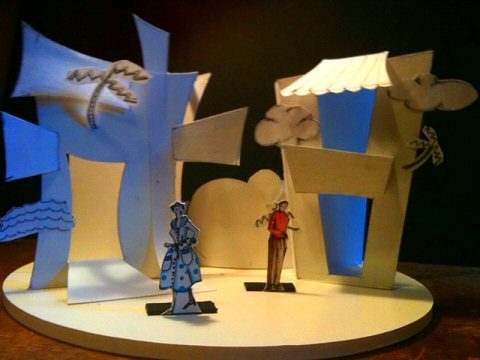 Perusing the program notes before the production, I stumbled onto Garnett Bruce’s (Stage Director) thoughtfully written introduction. Bruce challenges the audience to accept the surrealism and search out the lessons in both Poulenc’s Les mamelles de Tirésias and Ravel’s L’enfant et les sortilèges. He further dares us to look beyond the absurdity into the complex layers of harmony, timbre, and human characterization. He even writes, “Puppets and animation could do better justice to angry clocks and dangerous fire, to wacky gamblers and pompous policemen, but the inherent human element of both of these pieces must never be lost.” Which led me to wonder — are we able to accept surrealist opera performed by humans in our Disney animation-dominated world?
Perusing the program notes before the production, I stumbled onto Garnett Bruce’s (Stage Director) thoughtfully written introduction. Bruce challenges the audience to accept the surrealism and search out the lessons in both Poulenc’s Les mamelles de Tirésias and Ravel’s L’enfant et les sortilèges. He further dares us to look beyond the absurdity into the complex layers of harmony, timbre, and human characterization. He even writes, “Puppets and animation could do better justice to angry clocks and dangerous fire, to wacky gamblers and pompous policemen, but the inherent human element of both of these pieces must never be lost.” Which led me to wonder — are we able to accept surrealist opera performed by humans in our Disney animation-dominated world?
Bruce’s notes weren’t even the most provocative in the program. Eileen Cornett (Musical Coach) wrote poignantly about trying to find meaning in the strange and sometimes illogical text of the French poet, Apollinaire. She made an interesting modern connection between “Don’t Ask, Don’t Tell” and Poulenc/Apollinaire’s exploration of sexual identity. As the orchestra tuned, I heard the sweet undergrads next to me quietly confess to one another that this was their first opera. I only wish that I could have asked them if they made the same associations and bonded with the human surrealism suggested in the program notes.
I was pleasantly surprised to see the wonderful Dr. Seuss-like sets and costumes. Peabody’s co-production agreement with Temple University is certainly paying-off there. The primary indoor setting turned 180˚ on its platform to reveal a unique street scene that the characters would pass through in seamless transitions. In Les mamelles de Tirésias, Amber Schwarzrock sang Thérèse/Tirésias with exuberance. Her shimmering top notes soared over the orchestra. She also elicited genuine laughter from the audience with each silly gender shtick. Christian Waugh and Tyler Lee were in strong Laurel and Hardy form with their comical singing and acting. Jayson Greenberg sang the beleaguered husband with aplomb. His lovely bright timbre suited the language when he wasn’t being covered up by the orchestra (the fault here is with the orchestra.)

After a brief intermission, the audience settled back into their seats for an operatic predecessor to Where the Wild Things Are, Ravel’s L’enfant et les sortilèges. Without delay, Mary-Lacey Rogers was quite convincing as the naughty little boy. Alternating between trumpeting and soothing, her voice was resonant and colorful. Stephen Campbell and Yoonjee Ha (Wedgewood Teapot/Chinese Cup) were showered with approving chuckles for their portrayals – both very present in voice and characterization. Les chiffres were just the most adorably menacing numbers, which provided a brief bit of levity in the action. The two cats, played by Kristina Lewis and Michael Maliakel, were honey-voiced and especially charming in their duet. Lisa Perry (Fire/Enchanted Princess/Nightingale) shone as the Enchanted Princess, her voice really seemed to open up and relax during her duet with the child. The chorus members also seemed much more confident in L’enfant, the final chorus was quite satisfying.
The questions I asked at the rising of the curtain were certainly answered by the final bows. Overall, I was impressed with Peabody Opera’s double bill production. Surrealist and absurdist operas may be “too weird” for a generous amount of the population, but these productions were a positive introduction to a different kind of storytelling. The enhanced sets and costumes benefitted the suspension of disbelief and the singing was enjoyable. Furthermore, I am happy to see Peabody programming these types of productions that include many resume-building characters and right-sized roles for their students. That’s a human element to these operas that I can truly understand.
Related Articles
- Fantastic Mr. Fox the opera: interview with Tobias Picker (telegraph.co.uk)
- in performance: The Music of Derek Bermel (sybariticsinger.wordpress.com)
